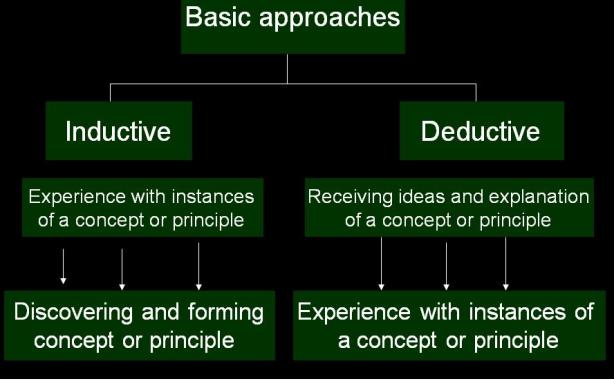Selasa (07.02.2010)
Berikut merupakan hasil pembelajaran kami pada hari tersebut:
THINKING SKILLS
- Mental process that requires an individual to integrate knowledge, skills and attitudes
- Foundation for thoughtful learning
- Thoughtful learning is achieved when students are actively involved in the learning
- Categorized into critical thinking skills and creative thinking skills and thinking strategies.
PROCESS SKILLS AND THINKING SKILLS
Khamis (10.02.2011)
Berikut merupakan hasil pembelajaran kami pada hari tersebut:
Teaching Approaches
Basically, teaching of science can be divided to two basic approaches; namely the inductive and deductive approach. The inductive approach provides students with learning situations in which they can discover a concept or principles. In deductive approach on the other hand, a concept or principle is given and discussed, followed by experiences to further illustrate the idea presented.
Inquiry learning
‘ teachers presenting information’ to ‘ students learning sc themselves’ through active involvement
– skills of asking questions
– planning an investigation
– gathering data
– using appropriate tools
– explaining relationship
– communicating the results
– originating the problem
– formulating hypothesis
– designing investigative approach
– conducting experiments
– synthesising knowledge
Constructivism
Constructivism is a view of learning based on the belief that knowledge isn’t a thing that can be simply given by the teacher at the front of the room to students in their desks. Rather, knowledge is constructed by learners through an active, mental process of development; learners are the builders and creators of meaning and knowledge. Constructivism draws on the develomental work of Piaget (1977) and Kelly (1991). Twomey Fosnot (1989) defines constructivism by reference to four principles: learning, in an important way, depends on what we already know; new ideas occur as we adapt and change our old ideas; learning involves inventing ideas rather than mechanically accumulating facts; meaningful learning occurs through rethinking old ideas and coming to new conclusions about new ideas which conflict with our old ideas. A productive, constructivist classroom, then, consists of learner-centered, active instruction. In such a classroom, the teacher provides students with experiences that allow them to hypothesize, predict, manipulate objects, pose questions, research, investigate, imagine, and invent. The teacher’s role is to facilitate this process.
Piaget (1977) asserts that learning occurs by an active construction of meaning, rather than by passive recipience. He explains that when we, as learners, encounter an experience or a situation that conflicts with our current way of thinking, a state of disequilibrium or imbalance is created. We must then alter our thinking to restore equilibrium or balance. To do this, we make sense of the new information by associating it with what we already know, that is, by attempting to assimilate it into our existing knowledge. When we are unable to do this, we accommodate the new information to our old way of thinking by restructuring our present knowledge to a higher level of thinking.
Similar to this is Kelly’s theory of personal constructs (Kelly, 1991). Kelly proposes that we look at the world through mental constructs or patterns which we create. We develop ways of construing or understanding the world based on our experiences. When we encounter a new experience, we attempt to fit these patterns over the new experience. For example, we know from experience that when we see a red traffic light, we are supposed to stop. The point is that we create our own ways of seeing the world in which we live; the world does not create them for us.
Constructivist beliefs have recently been applied to teaching and learning in the classroom.
Contextual learning
Contextual Learning is reality-based, outside-of-the-classroom experience, within a specific context which serves as a catalyst for students to utilize their disciplinary knowledge, and which presents a forum for further formation of their personal values, faith, and professional development. Beyond the challenge of direct, meaningful experience, contextual learning requires reflection to build lasting cognitive connections. Contextual learning is useful for child development as by providing learning experiences in a context in which the are interested and motivated in they are able to achieve more. Contextual learning structures may include internships, service learning, and study abroad programs, among others.” This definition was formulated in 2002 and presented at the annual conference proceedings of the National Society for Experiential Education by Michael True.




